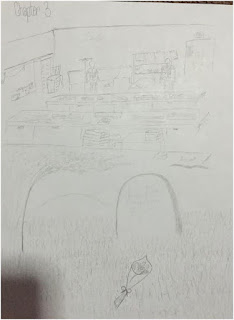Tuesday, September 15, 2015
MI Survey
In these graphs it says i am a visual and existential person which i had not expected but i did expect naturalist and musical to be the lowest because i mostly like to stay indoors and I'm not very musically skilled in fact i can not make a rhythm.
Saturday, September 12, 2015
Chapter 3 & 4
Illustrator
In Chapter 3 Maples describes his lab which is what I drew in the image
above. In the second drawing I tried to represent the respect for the
dead which Maples says is very important.
In my drawing I tried to demonstrate different aspects of the cases that
Maples discuses. The main theme I found in the stories was that the victims
were shot with guns.
Something disturbing was Maples description of his old case of the old man in Miami and died at age 95. Before his death the old man used to threaten his neighbors by saying "he had murdered his son-in-law and disposed of the body in a septic tank " (52). however no one ever listened to the old man not even when he was dying. The only reason Maples knew it was true was because the new house owners found the body in the tank. I guess i found this case so disturbing because it reminds me that we never really know anyone and we could all have a body in their septic tank.
Something disturbing was Maples description of his old case of the old man in Miami and died at age 95. Before his death the old man used to threaten his neighbors by saying "he had murdered his son-in-law and disposed of the body in a septic tank " (52). however no one ever listened to the old man not even when he was dying. The only reason Maples knew it was true was because the new house owners found the body in the tank. I guess i found this case so disturbing because it reminds me that we never really know anyone and we could all have a body in their septic tank.
Chapter 2:
"Talkative Skulls"
The second chapter deals with the insecurities and difficulties of the job. Maples loved his job and discusses his first cases dealing with bodies. He says he had a fondness with his first cases and they seemed interesting, I'm assuming because it was new. He discuses the correlation between anthropology and crime and how forensic anthropology and forensic pathology.
Every Day is Halloween
Chapter 1 summary:
Every Day is Halloween
Throughout the first chapter of Dead Men Do Tell Tales the narrator, William R. Mapeles, he describes the 'nightmares' of his profession. For us crushed bones or severed heads are a strange however he writes about how these are everyday things in his line of job. In the University of Florida he teaches graduate students physical anthropology. His first experience with anthropology was accidentally by taking a course because it was available however, he credits Tom McKern for being his mentor. Over all this chapter helps understand William Maples his way into anthropology and experiences that shaped him.
Subscribe to:
Posts (Atom)


